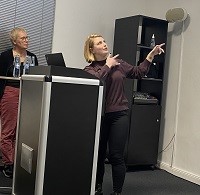
LIGA stands for "Lokales Integriertes Gesundheitszentrum für Alle" which can be translated as "Local Integrated Health Centre for All". As such, it aims to provide the people of Gröpelingen with orientation and support in health issues. Project coordinator Christina Kisner presented the concept and structure of the LIGA at the SOCIUM's Health Policy Lecture Series on 10.01.2024.
Gröpelingen has a comparatively young, multicultural population, and is poorer than average. The social structure also has an impact on health care, for example in that language barriers make it more difficult for the population to access the health system. In addition, the number of licensed doctors is decreasing and there is a risk of a local shortage.
The LIGA health centre aims to counter this by combining medical-therapeutic care, counselling services and neighbourhood work. "From the very beginning, it was an idea of LIGA to cover services that are not purely medical, but require a lot of time for advice," says Kisner. This includes, for example, finding specialists, making appointments and pointing out possibilities for individual health promotion.
Planning for the centre began in 2020, and the counselling service, which is an important pillar of the health centre, opened in September 2022. Here, Gröpelingen residents can obtain comprehensive counselling services in different languages, from open health advice to help better understand illnesses and accompany them to doctors' appointments, to advice on the Corona virus or fitness and exercise courses, as well as assistance with form filling.
In addition to planning a new building for the health centre, Kisner and her colleagues and volunteers are currently working on involving the medical profession in the further design process. In discussions with doctors, they aim to establish which gap the LIGA project is intended to fill and what services are still lacking.
However, it is not only the participation of medical experts that is vital for the LIGA, but also the involvement of people from the district. Here, Kisner emphasizes, the LIGA also differs from other, similar projects: "We use a network that the Gesundheitstreffpunkt West has built up over the last 38 years." The starting point of the LIGA was not medical care, but social district work. LIGA is often out and about in the district and at festivals, with its mobile health advice service, and it organizes activities such as the "Gröpelinger Zahnheld*innen (Tooth heroes)," an educational event for children that focuses on dental care. In this way, the centre works where the people it wants to reach live: "Outreach work is the gold standard for a district like Gröpelingen," Kisner emphasizes.
The idea of a structure that supports and improves medical care within a district has been discussed for several years, especially prominently under the term "Gesundheitskioske" (health kiosks) of which Federal Health Minister Karl Lauterbach aims to build 1,000 units throughout Germany. In Bremen, the problem of inadequate medical care in socially disadvantaged districts has been under discussion since 2015, and the LIGA in Gröpelingen emerged from this. The topic of district-based health care was already discussed with Dr. med. Johannes Grundmann and Alexander Fischer at two Health Policy Lecture Series events last year. In the coming semester, the discussion will be continued on 17.04.24 with a lecture from Heike Schiffling from the HebammenZentrum West (Midwifery Center).
The Colloquium on Health Policy lectures are moderated by Prof. Dr. Heinz Rothgang and Prof. Dr. Eva Quante-Brandt and take place at the Haus der Wissenschaft, Sandstraße 4/5, 28195 Bremen. Prior registration is not necessary and admission is free. All talks are in German.
Find more information here.
Text: Maren Emde











